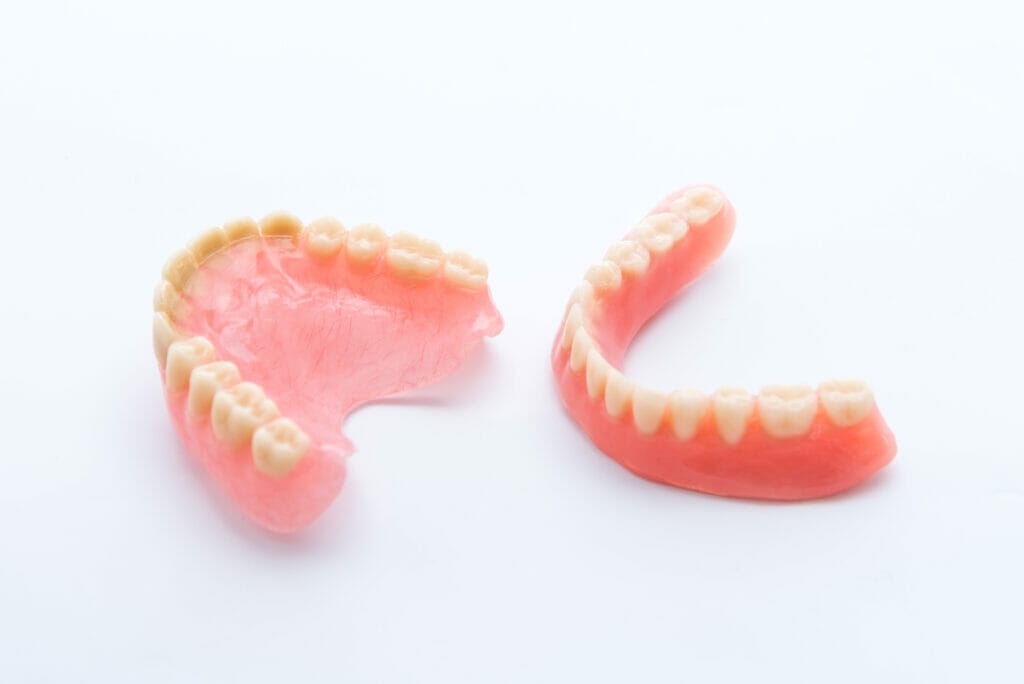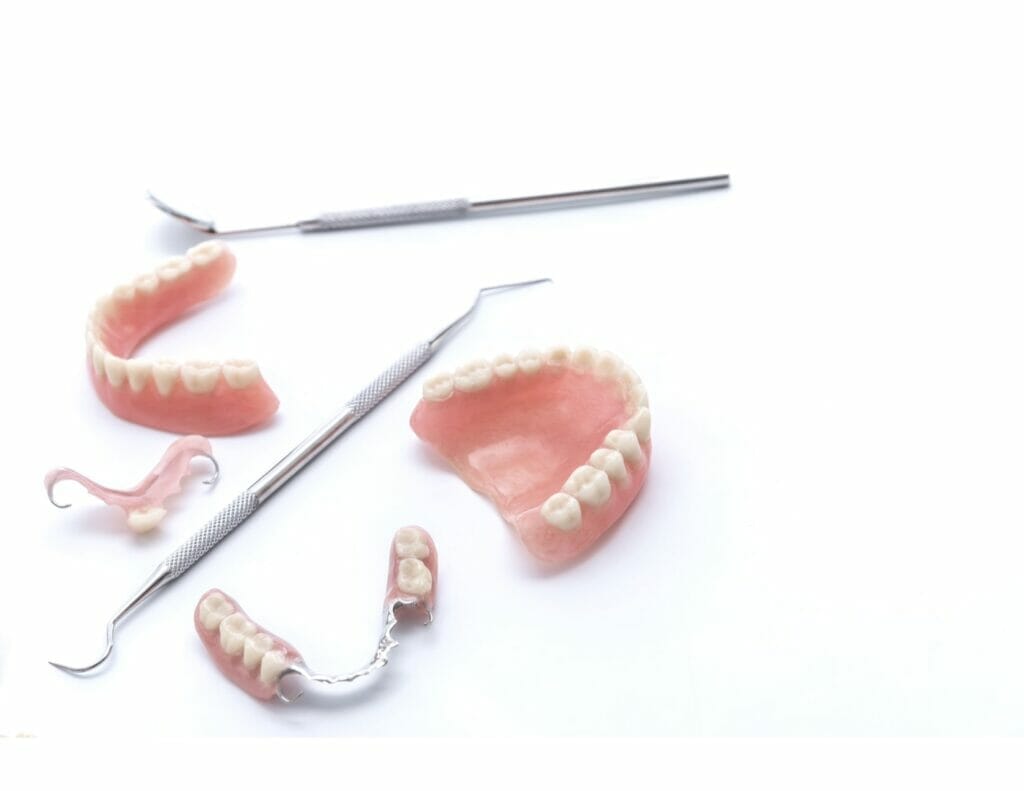
Hi, I'm Kyle Hornby, the Dentist and Owner at Enamel Republic. I write my own blog articles and a few times each year, I take on a really BIG topic with the aim of writing the most comprehensive guide out there. This time around, I'm tackling the enormous topic that is Dentures.
I want to help you make the transition from painful, failing teeth to Dentures smoothly and without any surprises along the way.
With the right knowledge, it can be done.
And, I'm here to help.
Now, we're a Family Dental Clinic, but we specialize in dentures and oral surgery. I've been teaming up with patients on their transition from tooth extraction to dentures since I started practicing Dentistry, almost a decade ago. For me, working to get patients pain- and infection-free, so that they can enjoy the ability to smile again is extremely rewarding.
So, let's talk about dentures...
Dentures are so popular because they provide a cost-effective way to replace many teeth. And, contrary to stigmas surrounding dentures, they can work quite well if case selection and planning are done properly. I guess what I'm saying is that you don't have to spend tens of thousands of dollars on replacing your teeth with dental implants.
Not everybody has the kind of funding needed to replace teeth with implants and, hey, that's okay. It's also okay to not have your own private jet.
I'd like to get to the valuable info quickly so that I'm not wasting your time. But, first, I'd just like to say that my goal with this guide is to give you a playbook on planning your transition from having teeth removed to settling into a new set of dentures. This guide will also be helpful to those who already have dentures and may learn a few things about maintaining and getting the most from them.
So, without further delay, I'll start by talking about when it makes sense to transition to dentures and go from there.
Along the way, we'll talk about partial dentures, complete dentures, extractions, healing treatment costs & timelines, as well as tips and secrets for maintaining your denture and minimizing long-term costs.
Let's get to it...
There's not an exact situation, scenario or transition time I can give you for making the move to dentures.
I can tell you that most patients start to look into dentures when they're fed up with their teeth breaking, getting infected, causing pain and generally, costing them lots of money. Dental care is really expensive and teeth become especially frustrating to maintain when costly treatment breaks or fails.
Usually, if a patient has a few dental emergencies like this within a short period of time, they reach a breaking point and are ready to look at moving to dentures.
The other major factor is that your Dentist helps to guide you through decision making about your oral health. That means that your Dentist's philosophy can affect when you make the transition to dentures.
Some Dentists try to save every natural tooth at all costs. Others try to see into the crystal ball - that is, they try to anticipate a period of decline with teeth and gums to help you avoid suffering sunken costs (these are costs you might pay on fillings, root canal treatments and dental crowns on teeth that may end up requiring removal in the near future).
Personally, if I see a patient with many teeth that aren't likely to last more than 4-5 more years (due to cavities, repeated fractures or gum disease and bone loss), I present dentures as a treatment option.
It helps people to start thinking about cost efficiency, particularly avoiding sunken costs on failed treatments.
So, while there's no precise answer as to when dentures might make sense for you, it generally occurs when you and your Dentist come to a decision that the teeth you have aren't worth maintaining any longer.
Next, I'm going to switch things up a bit.
I usually like to sprinkle in information on treatment costs later in my posts and articles but I know cost is a super important piece of info. I'd also feel really bad if somebody read this article, got to the end, and then realized that either dentures are too expensive for them or that they can afford something more expensive and non-removable (like dental implants).
So, let's get into treatment costs a little bit and then I'll break down types of dentures available on the market.

There are lots of variations on dentures that differ in design and material but I'll keep things simple and tell you that there are 2 general categories when it comes to dentures: complete and partial.
A complete denture replaces all of your teeth. A partial denture replaces some of your teeth (this is an option when you have multiple healthy teeth left).
Complete and partial dentures both cost around $1,500 in Canada. The other really convenient thing about dentures is that they cost about the same whether you're replacing 4 teeth or 9.
They don't price out like dental implants and dental crowns. These solutions have a linear price scale. For instance, a single dental implant and crown will cost around $5,000 while 2 will cost twice as much, or $10,000.
How much for 3?
You guessed it: $15,000.
This is one of the main reasons why people find dentures really cost-efficient. With dentures, you can get more "bang for your buck".
So, if you're planning a transition to dentures, just know that you'll be looking at about $1,500 per dental arch for either complete or partial dentures. If you're making the jump into upper and lower dentures at the same time, you're looking at about 2 x $1,500, or $3,000 in total.
Ok, what next? Let's keep going with basics and talk about the differences between partial dentures and complete dentures. It will give us an opportunity to look at the conditions that might make one a better choice over the other.
Above, we talked about cost and, for simplicity, I told you that there are complete dentures and partial dentures.
While there are many variations on each, thinking about dentures as offering 2 general options is, I think, for the best.
One thing that I absolutely have to tell you is that complete upper dentures work quite well. They cover the roof of your mouth or palate and can generate good suction and "hold". In contrast, lower complete dentures are smaller, have less surface contact with gums, and can't generate suction.
What I'm saying is that lower complete dentures tend to be more loose compared to uppers.
So, why am I telling you this?
Well, this difference in performance between upper and lower dentures means that, if possible, you should always try to hang on to a few lower teeth and go with a partial denture.
Partial dentures have metal clasps or arms that hook on to natural teeth. This helps to anchor them.
You can't generate suction and "stick" with lower complete dentures so being able to anchor on a few natural teeth for hold provides a huge advantage.
So, generally, we are more comfortable going with complete upper dentures (if the situation dictates it) than complete lower dentures. If there are 3 or more fairly healthy teeth in the lower arch, a partial denture will prove superior to a complete one.
Does that mean that you shouldn't keep a few good upper teeth if you have them?
That sounds crazy, right?
Well, it's actually not. The reason is that, once you place a hole or two in a complete upper denture to fit around existing teeth, you lose all your suction (this is the kind of suction you can never generate with a lower complete denture).
So, in the case of upper dentures, a complete will outperform a partial that's anchored to 2-3 teeth every time.
If you have 5-6 good upper teeth (or more), then definitely go with a partial denture. It would be aggressive (and irrational) to remove that many good teeth.
For all the visual folks out there, here's what an upper and lower complete denture look like...

Here's another picture of dentures - the one at the bottom of the image is a cast metal and acrylic partial denture...

You can also get some visuals for compete and partial dentures at the Canadian Dental Association website, here.
Now, that we've gone through a brief comparison of complete and partial dentures, I'd like to get to some more fundamentals about the path to dentures. Specifically, what preparation work is needed and what is a dental extraction appointment like?
So, this may seem like a really big and broad topic. But, we can simplify this topic quite a bit by breaking things down into 2 categories: prep work for complete dentures (tooth extractions) and prep work for partial dentures (preparing your remaining teeth).
This section will also help you to understand additional costs beyond simply paying for your denture. (You'll recall from above that an upper OR lower denture costs about $1,500).
First, let's talk about preparatory work and decision making for complete dentures.
When people transition to complete dentures, the biggest part of the journey is having their remaining teeth removed. Above, we talked about dentures costing about $1,500 but tooth extractions add cost to the overall financial picture.
For this reason, it's important to get a comprehensive cost estimate from your Dentist. That way you can be clear on overall expenditures and this will enable you to plan accordingly.
Feel free to ask your Dentist about any future expenditures after healing or farther down the line related to denture maintenance, as well
So back to tooth extraction costs...
Generally, a simple (uncomplicated) tooth extraction costs around $150. Difficult (surgical/complicated) extractions cost around $275 per tooth.
There may be some supplementary procedures associated with transitioning to dentures in addition to tooth extractions.
For instance, if you have a rough or bumpy jaw and gums, you Kitchener Dentist may suggest re-contouring so that your denture fits more comfortably. The Dentist herself may provide this service at your appointment for extractions or they may refer you to an oral surgeon.
Generally, this bone re-contouring, or alveoplasty, can cost around $1,000.
The "take home": Dental extractions cost about $150 to $275 per tooth and add significant expense to your transition to dentures.
There aren't always options with certain dental treatments but with dentures, you get options!
The old way of doing dentures was such that you had your teeth removed, healed up for 5-6 months (yes, without any teeth at all) and then had your complete denture made.
5-6 months without any teeth?
Sounds inconvenient to me.
Now, we offer immediate dentures so that you can have something in place the second after your remaining teeth are removed.
But, how can the immediate denture fit well?
Well, it doesn't exactly.
The idea is that the immediate denture is an approximate fit to your healing jaw, post-dental extraction. It gives you something to cover and protect healing gums, and you can eat with it.
Here's the wrinkle: after 4-6 months of healing (sometimes less than that), you get your immediate denture relined.
But, what's a reline?
A denture reline involves resurfacing the underside of the denture. The goal in doing this is to fill any gaps between the denture and your gum tissue.
That's right, more surface area in contact with your gums means better support, better suction and greater hold for your denture.
The reline costs about $400 - $600, so it's an added expense.
But, it allows you to have a denture right from day one that you can eventually resurface to become your permanent or forever denture.
The "take home": You can choose a delayed or immediate denture but the immediate denture approach costs a bit more but adds tons of convenience!
Before you have any remaining teeth removed, your Dentist will see you for a brief appointment to discuss transitioning into complete dentures, answer any questions you may have, and to take the impressions necessary for designing your new set of teeth!
At that point, you'll be waiting about a week for a lab to make your new complete dentures prior to the BIG appointment where you'll get your new smile.
So, you're probably wondering, what's the tooth extraction and denture delivery appointment like?
Well, people tend to dread this appointment to some degree because they'll be saying goodbye to their natural teeth. Some also fear that they'll experience pain or discomfort during the procedure.
It's generally very reliable to achieve full numbness for tooth extractions. At Enamel Republic, we find patients are often surprised (and delighted) at how simple and comfortable the whole procedure is.
You always have the option to request sedation for your extraction appointment. And, sedation doesn't haven't have to mean being put to sleep for the procedure. There are all kinds of milder conscious sedation options including Nitrous Oxide or Laughing Gas.
So, ask your Dentist about dental sedation options if you're feeling anxious about your dental extraction appointment.
Now, back to tooth extractions...
Removing a tooth shouldn't be an exercise in brute force. People who provide dental extractions capably do so with technique, not strength. Just remember, when it comes to removing teeth, "F" is for finesse, not force.
From there, once teeth are removed, your Dentist may place stitches to help the gums heal more quickly and minimize the risk of post-operative infection.
Your Dentist will then place your new dentures and check the fit. They may make adjustments to your denture at this appointment. Any adjustments will help to make your bite comfortable and even and minimize excessive pressure on any healing areas.
Next, you'll head home (likely with a prescription for antibiotics and pain control medication to increase the likelihood that your healing period goes smoothly) to heal.
You may be wondering, what can I eat after my extractions?
Generally, you're going to want to limit yourself to softer foods for the first few days of healing. If you can eat with your new denture in place, that's great. If you need to remove it for some meals to alleviate soreness, that's okay too.
Soups, yogurt, oatmeal and other softer foods work well during post-extraction healing.
You'll also want to avoid intense heat (from tea and coffee) as it can stimulate bleeding.
While you're waiting 4-6 months for your gums to heal to a more stable shape, you'll probably need to see your Kitchener Dentist a couple of times for soft relines.
Soft relines?
As your gums heal, they tighten up and become more firm. They also "shrink" as inflammation subsides. So, you get an increase in gaps between your denture and gum tissues.
Gaps aren't good. Gaps = looseness.
So, every couple of months, your Dentist can add a soft liner to fill in the gaps. You'll re-establish a comfortable fit and maybe even suction or "hold".
These appointments will also allow your Dentist to monitor your gums as they heal.
Once your gums get to that stable shape your Dentist is waiting for, you'll be ready for a final denture reline.
This is essentially the end of your transition to dentures.
The final reline appointments are some of the easiest you'll ever experience in a dental office. Typically, you show up in the morning and your Dentist applies a putty to the underside of your denture and seats it in place, essentially taking an impression of your healed gums.
Your Dentist will then send the denture and attached reline putty to a lab, where the putty is converted to pink denture acrylic and annealed to your existing denture.
This process can be completed in about a half a day so that you can pick your completed denture up in the afternoon.
You'll notice a big improvement in the overall fit and function after your final reline.
Okay, now that we've become experts on Complete Denture transitions, let's talk about Partial Dentures.
So, we just got through Complete Dentures 101. We talked about Complete Dentures being a reasonable solution when most or all remaining teeth are heavily decayed, fractured or when gum disease has erased much of the supporting bone around the teeth.
When, then, do partial dentures make sense?
Well, let's recap some of what we talked about near the beginning of the article. We know that upper complete dentures work much better than do lower complete dentures. This puts us in a position where we try our best to make a go of partial dentures when restoring the lower arch.
If we have a few robust teeth (or more) left in the lower dental arch, we go with a partial denture.
For an upper partial denture to make sense, the overall rationale is a little different. Stick with me, here...
Upper complete dentures provide good suction, hold and overall fit. Keeping a few natural teeth will actually eliminate suction because you'll need to have openings in the denture to fit around those teeth. An upper partial denture resting on a few good teeth performs poorly compared to a complete upper denture (believe it or not). So, this means that, for an upper partial denture to make sense over an upper complete denture, you need to have a lot of good quality natural teeth remaining.
It's hard to put a number on it, but I'd say that you'll want to have at least 8 of your original 14 upper teeth for a partial denture to make sense over a complete denture. Fewer than 8 teeth? A complete denture probably makes more sense.
So, now we have a sense of when upper and lower partial dentures make sense.
Next, let's talk costs...
When we discussed complete dentures above, the majority of extra costs were to cover tooth extractions.
While you may need some teeth removed prior to making your partial denture(s), typically you'll be removing fewer teeth (if any) prior to your partial denture transition.
So, generally these costs will be much lower.
In fact, most of the preparation that comes with moving to a partial denture involves modifying your remaining teeth, not extracting them.
So, let's discuss the short series of appointments needed to produce your partial dentures...
You're typically looking at a minimum of 2-3 appointments on your path to partial dentures.
As I mentioned above,
This is because partial dentures have parts that interact with your remaining teeth to provide stability and retention.
Essentially, your remaining teeth act like fence posts or anchors for your partial denture. The denture will have between 2-4 metal arms or clasps that slide onto teeth to provide some "hold" to your denture. Your partial denture will also have little metal rests that slide into grooves or "dimples" prepped into some of your remaining teeth.
These modifications are called rest preparations, or rest preps. Your Dentist will shave a tiny oval into the enamel or filling material on any teeth where a rest will fit into place.
Does this hurt?
Rest assured it does not.
Making rest preps takes about 10-15 minutes and can typically be completed without the need for local anesthetic injections.
One your teeth are prepped to optimize how your partial denture fits around them, your Dentist will take a few impressions and your appointment is done!
About 1-2 weeks later, your Dentist will see you again to try in the metal framework or skeleton, upon which your denture teeth will be placed. You can think of the framework as the parts of the denture that will surround some of your remaining teeth and clasp onto others.
If your framework fits nicely, your Dentist will send the framework back to the lab to have teeth added in, producing the final product. If adjustments are necessary, your Dentist will typically make them chair side and then send the framework to the lab to have the denture completed.
In rare cases, your Dentist may require new impressions and 1-2 extra try-in appointments to resolve any issues with the fit of your denture.
By Dr. Kyle Hornby, Kitchener, ON Dentist
Our Dentist Office is located in Downtown Kitchener, Ontario. We are a short drive away for families in Waterloo, Breslau & St. Jacobs. Our central location means we truly offer family dentistry near you!
This article is not intended to be a substitute for professional advice, diagnosis, or treatment. Accordingly, always seek the advice of your Dentist or other healthcare providers regarding a dental condition or treatment.
